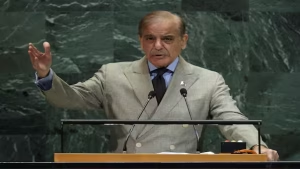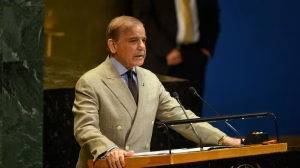New Delhi – Pakistan Prime Minister Shehbaz Sharif delivered a scathing address at the 80th United Nations General Assembly on Friday, condemning India’s decision to place the Indus Water Treaty in abeyance. Speaking before the international community, Sharif characterized India’s actions as defying international law and declared any violation of the Indus Water Treaty as “an act of war.”
The Pakistani leader’s inflammatory rhetoric marks a significant escalation in the ongoing water dispute between the two nuclear-armed neighbors. Sharif emphasized that Pakistan would defend what he termed the “inseparable right” of his people to these crucial water resources, highlighting the critical importance of the Indus Water Treaty for regional stability.
India’s Strategic Counter-Terrorism Measure

India implemented the Indus Water Treaty abeyance as a direct counter-measure following Pakistan’s alleged cross-border terrorism activities. The decision came after the devastating Pahalgam terror attack on April 22, which claimed 26 lives and prompted India to reassess its water-sharing arrangements with Pakistan.
Indian officials have consistently linked the reinstatement of the Indus Water Treaty to Pakistan’s verifiable cessation of cross-border terrorism support. This strategic approach demonstrates India’s willingness to use water diplomacy as leverage against what it perceives as Pakistan’s continued support for terrorist activities.
Historical Context of the Indus Water Treaty


The Indus Water Treaty, brokered by the World Bank and signed in September 1960, represents one of the most enduring water-sharing agreements in international diplomacy. The treaty strategically divided control of the river systems, allocating India control over the eastern rivers Ravi, Beas, and Sutlej, while granting Pakistan rights to the western rivers Indus, Jhelum, and Chenab.
Despite surviving multiple wars and decades of strained bilateral relations, the Indus Water Treaty has frequently faced criticism within India. Many Indians view the agreement as providing Pakistan with an inequitable share of water rights, leading to ongoing disputes about implementation and interpretation.
Also Read: Trump On Kashmir Issue: Shocking US Clarification On India-Pak Dispute
Pakistan’s Accusations and International Appeal

In his UN address, Sharif accused India of unilaterally and illegally attempting to suspend the Indus Water Treaty, claiming such actions violate both treaty provisions and international law norms. Pakistan’s strategy involves appealing to the international community for support, positioning itself as the victim of Indian aggression.
Pakistan has initiated arbitration proceedings, which India has dismissed as a “desperate attempt” to deflect attention from Pakistan’s alleged terrorism support. Indian officials argue that Pakistan is manipulating the treaty process to avoid accountability for cross-border terrorism activities.
Kashmir Issue Resurfaces in Water Dispute
Sharif also raised the contentious Kashmir issue during his UN speech, linking it to the broader Indus Water Treaty dispute. He assured Kashmiri people of Pakistan’s unwavering support, predicting that “India’s tyranny in Kashmir will come to a halt.” This connection demonstrates how water rights and territorial disputes remain intertwined in South Asian geopolitics.
The Pakistani Prime Minister’s rhetoric on Kashmir reflects the complex relationship between water resources and territorial control in the region, where the Indus Water Treaty governs rivers flowing through disputed territories.
Contradictory Diplomatic Signals

Despite his harsh condemnation, Sharif simultaneously proposed restarting comprehensive dialogue with India on all outstanding issues. He declared Pakistan’s readiness for “composite, comprehensive, and result-orientated dialogue with India,” including discussions on Kashmir and presumably the Indus Water Treaty dispute.
This contradictory messaging – combining inflammatory rhetoric with diplomatic overtures – reflects Pakistan’s complex strategy of maintaining international pressure while keeping dialogue channels open.
Economic and Security Implications
Sharif highlighted Pakistan’s economic losses from terrorism, claiming $150 billion in damages and asserting that “Pakistan’s sacrifices are probably the biggest around the globe.” This narrative attempts to position Pakistan as a victim rather than a perpetrator of regional instability.
The suspension of the Indus Water Treaty carries significant economic implications for both nations, particularly for Pakistan’s agriculture-dependent economy. Water scarcity could exacerbate existing economic challenges and create additional humanitarian concerns.
Regional Stability Concerns
The escalating dispute over the Indus Water Treaty threatens regional stability between two nuclear-armed nations. International observers worry that water disputes could become catalysts for broader conflicts, making diplomatic resolution crucial for South Asian peace.
The international community faces the challenge of mediating between competing claims while ensuring that essential water resources don’t become weapons in the ongoing India-Pakistan rivalry, preserving the integrity of the Indus Water Treaty framework.

